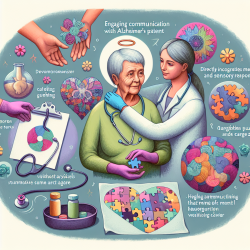Enhancing Communication with Alzheimer's Patients: A Practical Guide for Caregivers
Alzheimer's disease, a leading cause of dementia, significantly affects communication abilities, creating challenges for both patients and their caregivers. A recent systematic review titled "Methods to Enhance Verbal Communication between Individuals with Alzheimer's Disease and Their Formal and Informal Caregivers: A Systematic Review" offers valuable insights into improving these interactions. This blog will explore practical strategies from the review to help caregivers enhance communication with individuals living with Alzheimer's.
The Importance of Communication in Alzheimer's Care
Effective communication is vital for maintaining relationships and ensuring quality care for individuals with Alzheimer's. However, as the disease progresses, patients often struggle with object naming, coherence, and discourse production. These challenges can increase caregiver stress and may lead to conflicts or feelings of isolation. Therefore, adopting effective communication strategies is crucial for both caregivers and patients.
Key Findings from the Systematic Review
The review identified several promising methods for enhancing verbal communication, with memory aids and caregiver training programs emerging as particularly effective. However, the strength of evidence was limited due to methodological constraints in the studies reviewed. Here are some practical recommendations based on the findings:
- Memory Aids: These tools, which include biographical information and photos, help patients maintain focus during conversations. By providing visual cues, memory aids can improve topic maintenance and encourage more meaningful interactions.
- Caregiver Training: Programs like "FOCUSED" equip caregivers with techniques to maximize communication potential. Strategies include using direct, simple phrases, repeating key ideas, and utilizing nonverbal cues to maintain conversation flow.
- Activity-Based Programs: Engaging patients in activities, such as group meal preparation, can stimulate communication. These programs focus on maintaining functional skills and provide a shared context for interaction.
Implementing Effective Communication Strategies
To implement these strategies, caregivers should consider the following steps:
- Use Memory Aids Regularly: Incorporate memory books or wallets into daily interactions. These aids should contain familiar information and images to prompt conversation.
- Participate in Training Programs: Caregivers should seek out training opportunities to learn effective communication techniques tailored to Alzheimer's patients.
- Engage in Structured Activities: Plan activities that encourage communication, such as cooking or art projects, to provide patients with opportunities to express themselves.
Encouraging Further Research
While the review provides valuable insights, further research is needed to strengthen the evidence base for these interventions. Practitioners are encouraged to explore and contribute to ongoing research efforts, focusing on randomized controlled trials to validate the effectiveness of communication strategies.
By adopting these strategies, caregivers can improve their interactions with Alzheimer's patients, enhancing both the quality of care and the well-being of those affected by the disease.
To read the original research paper, please follow this link: Methods to Enhance Verbal Communication between Individuals with Alzheimer's Disease and Their Formal and Informal Caregivers: A Systematic Review










